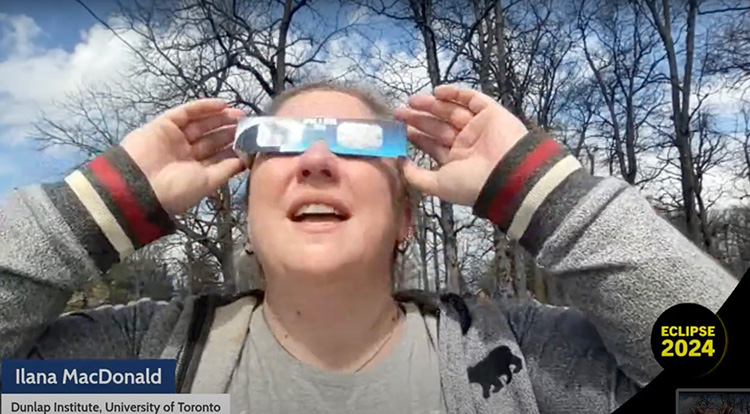Viewers around the world enjoyed the rare opportunity to “chase the shadow” as part of comprehensive livestream coverage of Eclipse 2024, thanks to the Dunlap Institute for Astronomy & Astrophysics.
Stationed in Six Nations Chiefswood Park near Brantford, Ont, Ilana MacDonald, public outreach, communications and events strategist with the Dunlap Institute, called upon experts along the path of totality across Ontario, Quebec and the Maritimes over a two-hour period. More than 12,700 eclipse enthusiasts registered for the online event — the most ever for an online U of T event — with more than 9,000 viewers logging on at one time and more than 77,000 streams overall.
“This eclipse offers a very rare opportunity. It is an almost total eclipse in the city of Toronto and many of the regions around Toronto will experience totality, where the moon fully covers the sun briefly,” Suresh Sivanandam, director of the Dunlap Institute said in welcoming viewers to the livestream.
“So the institute is making it a priority to bring it to everyone, especially those who are unable to be in the path of totality to see it with their own eyes.”

As part of Eclipse 2024: Chasing the Shadow from Niagara to Newfoundland’s in-depth coverage, MacDonald spoke to experts on-site at locations across Ontario, Quebec and the Maritimes. Pre-recorded videos included tips on safely viewing the eclipse, an analysis of the sounds of the sun, what to watch for during totality and much more.
MacDonald points out the livestream wouldn’t have been possible without its partners, including Brock University, Queen's University, Fort Williams Historical Park in Thunder Bay, Bishop's University, and Memorial University, whose members had travelled to Gander, Nfld.
“I really wouldn't have been able to put the whole thing together without them,” MacDonald says.
There were viewing parties and events held at U of T’s three campuses, and the Dunlap Institute distributed about 41,000 eclipse glasses to Toronto public libraries, and the St. George Campus.
While another eclipse won’t hit this area in our lifetime, there are options for those with eclipse fever.
“The next eclipse that will touch eastern Canada and the eastern United States will be in 2079, but there will be other eclipses happening somewhere on Earth before then,” MacDonald, who earned her PhD in astronomy and astrophysics from U of T in 2013, explained in the video. “So, if you [had] bad weather today and you're a little bit worried about not being able to see the eclipse today, and you have the ability to travel, you can always go see eclipses around the world.”
If you missed it, there’s still time to watch Chasing the Shadow. And if you want to know more about the world beyond Earth, read our eclipse-related coverage from the past year.

